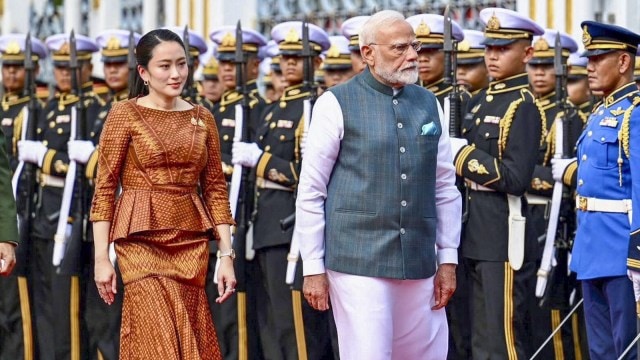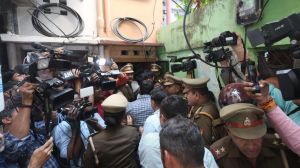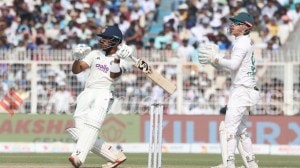AS PRIME Minister Narendra Modi met Thailand’s Prime Minister Paetongtarn Shinawatra in Bangkok on Thursday, the two countries agreed to upgrade their relations to a “strategic partnership”. Modi underlined that Thailand holds a special place in India’s Act East Policy and its Indo-Pacific vision.
Modi, who arrived in Bangkok on a two-day visit on Thursday, will attend the 6th BIMSTEC leaders’ summit on Friday. In his departure statement, Modi described BIMSTEC (Bay of Bengal Initiative for Multi-Sectoral Technical and Economic Cooperation) as a significant forum for promoting regional development, connectivity and economic progress in the region.

Following his meeting with Shinawatra ahead of the BIMSTEC summit, Modi said: “Today, we have decided to strengthen our ties into a strategic partnership. Also, we discussed establishing a ‘strategic dialogue’ between our security agencies.” A strategic dialogue between security agencies points to the development of a strong partnership as the two sides deal with crimes and maritime security issues.
Story continues below this ad
“We thanked the Government of Thailand for their cooperation in facilitating the return of Indian victims of cybercrime. We have agreed that our agencies will collaborate closely to combat human trafficking and illegal migration,” he said.
In an oblique reference to China’s assertive behaviour in the Indo-Pacific region, Modi said: “In the Indo-Pacific, we both support a free, open, inclusive and rules-based order. We believe in the policy of vikaasvaad, not vistaarvaad (‘development-ism’, not expansionism).”
 India’s Prime Minister Narendra Modi and Thailand’s Prime Minister Paetongtarn Shinawatra gesture as they meet at the Government House, in Bangkok, Thailand, April 3, 2025. REUTERS/Athit Perawongmetha
India’s Prime Minister Narendra Modi and Thailand’s Prime Minister Paetongtarn Shinawatra gesture as they meet at the Government House, in Bangkok, Thailand, April 3, 2025. REUTERS/Athit Perawongmetha
Shinawatra, 38, is the youngest daughter of former Thai PM Thaksin Shinawatra and niece of another former PM, Yingluck Shinawatra. Modi also met Thaksin Shinawatra, who he called a “great friend of India”. “Mr Shinawatra and I talked at length about India-Thailand cooperation and how it benefits the people of our respective countries. We deliberated on the immense potential in areas like defence, trade, culture and more,” he said in a post on X.
Modi and PM Shinawatra witnessed the signing of six pacts, including on the establishment of India-Thailand strategic partnership, MoUs on digital technologies, National Maritime Heritage Complex (NMHC) at Lothal (Gujarat), on Micro, Small and Medium Enterprises, and cooperation on Northeast India.
Story continues below this ad
“We have emphasised cooperation in the fields of tourism, culture and education between India’s northeastern states and Thailand. We discussed enhancing mutual trade, investment and exchanges between businesses,” Modi said.
Calling the ASEAN grouping a comprehensive strategic partner, he said: “As neighbouring maritime countries, we have shared interests in regional peace, stability and prosperity. India firmly supports ASEAN unity and ASEAN centrality.”
 Prime Minister Narendra Modi being presented ‘The World Tipitaka’ as a gift by his Thai counterpart Paetongtarn Shinawatra during a meeting, in Bangkok, Thailand. (PTI Photo)
Prime Minister Narendra Modi being presented ‘The World Tipitaka’ as a gift by his Thai counterpart Paetongtarn Shinawatra during a meeting, in Bangkok, Thailand. (PTI Photo)
Modi framed his visit in terms of close cultural ties between India and Thailand. “The age-old relations between India and Thailand are rooted in our deep cultural and spiritual ties. The spread of Buddhism has brought our people together. There have been exchanges of scholars from Ayutthaya (Thailand) to Nalanda. The story of Ramayana is deeply rooted in Thai folklore. And the influence of Sanskrit and Pali continues to resonate with our languages and traditions today,” he said. Earlier in the day, Modi watched a Ramakien (Thai Ramayana) performance.
Modi also conveyed condolences on the loss of lives caused by the earthquake on March 28.
Story continues below this ad
At the BIMSTEC summit, Modi will join leaders from Thailand, Bangladesh, Sri Lanka, Nepal, Myanmar and Bhutan to oversee the signing of the Agreement on Maritime Cooperation. He will share the stage with Nepal Prime Minister K P Sharma Oli, Bangladesh Chief Advisor Muhammad Yunus and Myanmar military junta leader Min Aung Hlaing, among others.



 India’s Prime Minister Narendra Modi and Thailand’s Prime Minister Paetongtarn Shinawatra gesture as they meet at the Government House, in Bangkok, Thailand, April 3, 2025. REUTERS/Athit Perawongmetha
India’s Prime Minister Narendra Modi and Thailand’s Prime Minister Paetongtarn Shinawatra gesture as they meet at the Government House, in Bangkok, Thailand, April 3, 2025. REUTERS/Athit Perawongmetha Prime Minister
Prime Minister 





